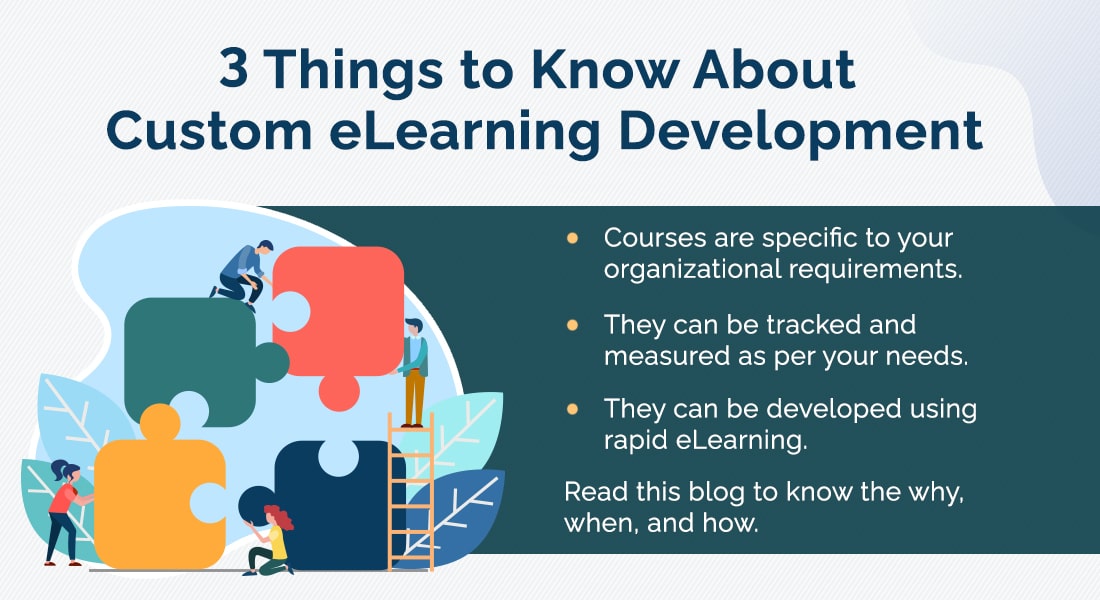Custom eLearning vs. Off-The-Shelf eLearning: What Should Your Organization Opt For?

ELearning has been doing the rounds in L&D for quite a while now, it’s market share is anticipated to grow at a CAGR of over 21% between 2021 and 2027. That is because of the various advantages it offers — eLearning helps cut down a lot of training time and cost for your organization, while keeping learning immersive for learners. No wonder there has been a surge in the demand for eLearning solutions in recent years.
Organizations that are making the shift from classroom training to eLearning solutions can either develop online training courses customized for their specific training needs or purchase ready-to-use off-the-shelf eLearning courses.
How do you, as a training manager, decide what’s best for your organization’s training requirements? This blog talks about the dilemma of deciding between custom eLearning vs. off-the-shelf eLearning courses by looking at the benefits of both these solutions and discusses everything you need to know before choosing the best option for your training needs.
Get acquainted with the ‘Real eLearning Trends’ for 2022.
Custom eLearning is Right for You When…
1. You Have Unique Training Needs
No two organizations operate the same way. They differ in terms of processes, systems, and organizational culture. They also have unique training requirements for which they can’t source content from external sources. For instance, courses on new employee orientation, product training, software systems, etc. need to be customized for the needs of your organization.
New Employee Orientation: Each organization has different employee orientation protocols, in terms of its vision and mission, hierarchy, departments, operations, applicable laws and regulations. Newly hired employees need to get familiarized with these and opting for off-the-shelf courses would be unsuitable for such training requirements that are company specific.
Custom eLearning vs. Off-The-Shelf eLearning
Custom eLearning is best suited for:
- Unique training requirements
- Content that changes often
- Flagship courses
Off-the-shelf eLearning is best suited for:
- Courses with generic content
- Urgent requirements
- Low budgets
Product Training: No two companies offer identical products or services. Even if they produce the same type of product, each organization will add some specific unique features to its product, to keep their products and services company-specific. Hence, they have unique product training requirements to train their sales and customer service representatives. In such cases, custom eLearning is the right choice as off-the-shelf courses aren’t suited for company-exclusive training needs.
ERP End-user Training: Once a software is purchased, it is used according to the business processes of an organization, and ERP end-user training is completely tied to an organization’s internal processes and working. How an employee will be trained, and which part of the training will apply to which roles in the organization will differ from organization to organization. Since this is an internal requirement, it is not in common knowledge, and so, no off-the-shelf course would cover it. Hence, custom eLearning is the best way to go.
Apart from exercising control over what to include in the training, you will also be saving a ton of time and effort when you opt for a custom eLearning course instead of trying to make extensive changes in an off-the-shelf course. And although they are more expensive than off-the-shelf eLearning courses, custom eLearning courses are more useful to the organization as they suit the requirements best and cannot be found elsewhere.
2. Training Content Changes Constantly
Nothing is permanent. No business has sustained in the market by following the same business operations and strategies; they are hence constantly looking to improve and evolve. Even the training needs of an organization tend to change over time. For instance, when a product gets updated with a new feature, or when your organization needs to comply with new laws and regulations, training also needs to be updated accordingly. In such cases, custom eLearning is the best choice, since it allows you to have complete control over the course development.
3. You Require Flagship Courses
Flagship courses are important prestigious courses of the company, which will be taken by all employees. A good example of a flagship course is one on the company’s mission, vision, and values, which help in setting direction for the company.
Off-the-shelf eLearning courses would not fit the bill in this case and custom eLearning is the way to go as the content can be curated according to the company’s needs, so as to develop training that’s most suitable for its employees.
You Can go with Off-The-Shelf eLearning When…
1. Content is Generic
For generic training on topics change management, and soft skills training like team building, effective customer handling, courses on Microsoft Office, etc., the content is basically uniform across organizations. There is really no need to develop these courses from scratch when off-the-shelf courses on the topics are widely available, and are more cost and effort effective than custom eLearning courses.
2. You Have an Urgent Requirement
In case your requirement is urgent, for instance, you have a deadline approaching and your entire organization needs to finish a compliance training on globally-applicable laws, you can readily buy an off-the-shelf compliance training course and roll it out to your learners in under 24 hours.
Compare this to custom eLearning courses, where it takes a minimum of 5-6 weeks to develop a 30-minute course, and you’re better off saving that extra time and money spent in the course development process by going for off-the-shelf eLearning. But remember this applies to training on very few topics, not all!
3. Running on a Low Budget
Especially during the current pandemic, with businesses running on low budgets, off-the-shelf eLearning courses seem the better option. The cost of an off-the-shelf eLearning course is relatively low as the development cost is distributed among many users. And most off-the-shelf eLearning vendors include maintenance and deployment in their services. Ready-made off-the-shelf courses are especially well suited for small to medium-sized organizations that lack a separate Learning & Development department to handle their training requirements.
Businesses that are just starting with eLearning can begin by taking small steps and purchase off-the-shelf eLearning courses so that learners can get to experience eLearning and become familiarize with the look and feel of eLearning courses.
You can start with soft skills training, selling and negotiation skills, and gradually step up and move toward custom eLearning.
Which phase of eLearning implementation are you in?
Summing it Up
The table below can give you an idea of which solution is suitable when compared against some of the important factors.
|
Need |
Custom Courses |
Off-the-shelf Courses |
| Content | For specific content | For generic content |
| Organizational Requirements | Can be developed to meet the organization’s requirements | Content is generic, and developed to meet the common requirements of a specific industry |
| Resources and Time | Requires multiple resources and a lot of time to develop | Can be rolled out quickly and do not require additional resources |
eLearning has been in the game of providing training solutions for a long time, and yet, a lot of organizations are unsure of the main differences between custom eLearning and off-the-shelf eLearning, which is how they end up making the wrong choice for their training requirements. To choose between custom eLearning and ready-made off-the-shelf eLearning, organizations can run a training needs analysis, jot down their requirements, and follow the above-mentioned list of applications.
For organizations that can spare a big bill to develop courses from scratch for company-specific requirements, custom eLearning is the best option as it offers total control in the development process. Explore how you can make a winning business case and convince your top team of the benefits of custom eLearning!





![What is Custom eLearning — Benefits & Tips for Effective Design [Infographic]](https://blog.commlabindia.com/hubfs/blogs/custom-elearning-benefits-design-tips.jpg)